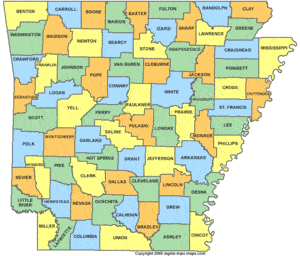The plaintiffs in Wright v. Smith argued that the Arkansas ban on same-sex marriage was unconstitutional. That ban, which was put on the ballot in time for the 2004 presidential election to help urge conservatives to get to the polls, was enshrined into the state constitution with a sweeping 75 percent of the vote. But no matter how much energy the State spent talking about the importance of a 3/4 majority, no majority, regardless of size, is allowed to violate basic human rights.
As a matter of state law, the Arkansas Constitution guarantees equality to all and the ban on same-sex marriage was a bald and odious attempt to "narrow the definition of equality" for no rational reason. True enough, but Judge Piazza reserved his eloquence and his most important holdings for the federal question of whether the state ban violated the U.S. Constitution.
 For Judge Piazza, two federal cases bore out-sized importance to the lawsuit before him. First, there was Loving v. Virginia. Loving was the 1967 case in which the Supreme Court ended racial discrimination in marriage. Judge Piazza saw the same arguments that attempted to justify banning blacks from marrying whites popping up again when the state tried to justify banning gays from marrying. Loving, and other cases, showed that tradition, mere hatred, and one group's concept of morality could not justify discrimination. It also emphasized the fundamental nature of the marriage right. What's more, it raised and then squashed the pitiful justifications for discrimination. Judge Piazza saw this as precedent and as a warning to Arkansas supporters of the marriage ban: Arguing against Loving is arguing on the wrong side of history.
For Judge Piazza, two federal cases bore out-sized importance to the lawsuit before him. First, there was Loving v. Virginia. Loving was the 1967 case in which the Supreme Court ended racial discrimination in marriage. Judge Piazza saw the same arguments that attempted to justify banning blacks from marrying whites popping up again when the state tried to justify banning gays from marrying. Loving, and other cases, showed that tradition, mere hatred, and one group's concept of morality could not justify discrimination. It also emphasized the fundamental nature of the marriage right. What's more, it raised and then squashed the pitiful justifications for discrimination. Judge Piazza saw this as precedent and as a warning to Arkansas supporters of the marriage ban: Arguing against Loving is arguing on the wrong side of history.
Loving was not the end of the story. It was Windsor that put the Arkansas plaintiffs over the top. This is true for several reasons. Justice Kennedy's decision ran through the various justifications for denying federal recognition to gay couples and since those justifications overlapped considerably with the justifications for same-sex marriage bans, Windsor had the effect of eroding the support structure for the remaining state bans on gays marrying.
 What's more, Windsor had the explicit effect of de-legitimizing any previous decision upholding a ban on same-sex marriage. Judge Piazza was the first judge to address this head on. Of all the cases Arkansas relied on to support the ban, two stood out: a 2012 Montana case that suggested that encouraging procreation is an important government objective and a 2006 federal appellate court case that upheld Nebraska's ban on same-sex marriage. The central problem with relying on those cases, Judge Piazza said, was that Windsor made them unreliable. Windsor held that DOMA was "invalid, for no legitimate purpose overcomes the purpose and effect to disparage and to injure [gay individuals seeking to marry] whom the State, by its marriage laws, sought to protect in personhood and dignity." Windsor was, at a minimum, a "rhetorical shift" that signalled that gays and gay marriages are now equal in the eyes of the Supreme Court. No irrational form of discrimination against gays could survive that.
What's more, Windsor had the explicit effect of de-legitimizing any previous decision upholding a ban on same-sex marriage. Judge Piazza was the first judge to address this head on. Of all the cases Arkansas relied on to support the ban, two stood out: a 2012 Montana case that suggested that encouraging procreation is an important government objective and a 2006 federal appellate court case that upheld Nebraska's ban on same-sex marriage. The central problem with relying on those cases, Judge Piazza said, was that Windsor made them unreliable. Windsor held that DOMA was "invalid, for no legitimate purpose overcomes the purpose and effect to disparage and to injure [gay individuals seeking to marry] whom the State, by its marriage laws, sought to protect in personhood and dignity." Windsor was, at a minimum, a "rhetorical shift" that signalled that gays and gay marriages are now equal in the eyes of the Supreme Court. No irrational form of discrimination against gays could survive that.
Here are some direct answers to your questions:
1. How can a state court judge make a decision on federal law?
State court judges are allowed to answer federal questions in their court rooms when those federal questions are attached to state law questions. In this case, the plaintiffs argued that the ban violated the Arkansas Constitution and the Federal Constitution. If this case ever gets to a federal court–it could be appealed through the state intermediate appellate courts, then up to the state supreme court, and then on to the U.S. Supreme Court–the federal judges would rely on the state court's interpretation of state law and could agree or disagree with his interpretation of federal law.
2. Will there be a stay?
Gay couples in Arkansas are already marrying, but the state has filed a motion with Judge Piazza for a stay. Since he declined to issue one at first, there is little reason to believe he will issue one now, unless there was some defective motion practice originally. I am not aware of that being the case, so the state could ask for a stay from the appellate court or the state supreme court. The more couples that marry, the more awkward a stay will become. But, as we saw with Utah, a stay can still be issued and may likely be.
 3. Why are only certain counties issuing marriage licenses?
3. Why are only certain counties issuing marriage licenses?
Several counties, including Pulaski County, where the first gay couple married, and Carroll County, in the far northwestern part of the state, started issuing marriage licenses as soon as they could after the decision came down on Friday night. But several county lawyers, including in Faulkner County just north of Little Rock, are arguing that Judge Piazza's ruling only applies to Pulaski because that's where he sits and that's his jurisdiction. Only a decision by the state supreme court, they argue, could bind all the counties. Other counties note that they simply don't have the proper paper work: all their marriage licenses say "husband" and "wife." The former argument has some merit; the latter does not.
***
Follow me on Twitter and on Facebook.
Ari Ezra Waldman is a professor of law and the Director of the Institute for Information Law and Policy at New York Law School and is concurrently getting his PhD at Columbia University in New York City. He is a 2002 graduate of Harvard College and a 2005 graduate of Harvard Law School. Ari writes weekly posts on law and various LGBT issues.



